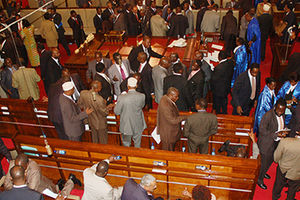
Parliament in session on November 9, 2023.
MPs have called out government ministries over their laziness and casualness in executing their legislative duties amid a tendency by the executive to abandon Bills in parliament without carrying out public participation.
In strongly worded tirades, National Assembly Majority Leader Kimani Ichung’wah (Kikuyu) castigated the executive for running away from its duties while using parliament as a scape goat.
This, Mr Ichung’wah said, potentially exposes the House to lectures from the courts over lapses in the law-making process, especially where Bills that have ended up being enacted into law are successfully challenged in court.
The lawmakers’ criticism of the executive follows the National Assembly's decision to halt the progress of the Livestock Bill 2024, citing significant public misgivings and inadequate engagement of the public by the Ministry of Agriculture and Livestock, the originator of the Bill.
“Ministries do not take time to sensitise members of the public on the policies underpinning those Bills before bringing them here,” Mr Ichung’wah said.
Speaking while addressing the issue in the National Assembly, Mr Ichung’wah said ministries’ abdication of their legislative responsibilities has led to widespread misinformation and disinformation, particularly on social media, as citizens are left to interpret the Bills on their own, often inaccurately. The suspension of the Livestock Bill, 2024 comes hot on the heels of a Court of Appeal declaration of the Finance Act, 2023 as unconstitutional for want of public participation. The Livestock Bill 2024, which was scheduled for its first reading in the National Assembly, has been met with widespread public backlash.
This has forced the House Business Committee, which prioritises businesses to be transacted in the House on a weekly basis, to stay the Bill's reading and any further considerations until the Ministry of Agriculture conducts comprehensive public outreach.
Livestock Bill 2024
The Livestock Bill 2024 lays out a tough regulatory regime for livestock production, research and training.
“A person shall not, whether as a business operator or otherwise, handle any animal feeds by way of engaging in any operation of production, manufacture, processing, storage, transport or distribution unless the person has been validly registered,” it says.
South Mugirango MP Silvanus Osoro noted that “when people read things and interpret them in their way, sometimes not very accurately, the misinformed ... use whatever has been published to incite others.”
“We have seen a lot of misinformation and disinformation being peddled online about this Livestock Bill,” said Mr Osoro.
This, even as Mr Ichung’wah emphasised that the suspension of the Livestock Bill aims to prevent it from suffering the same fate as the Finance Bill, 2024.
The MP further said that he has written to the principal secretary in charge of the State Department for Livestock, “asking him to conduct further public sensitisation on the Bill and the policy underpinning it.”
“Once this process is complete, we will await further guidance on whether the ministry wants to proceed with the Bill in its current form or make changes based on public feedback.”
The courts recently nullified the Social Health Insurance Act 2023, Primary Health Care Act 2023 and Digital Health Act 2023, terming them unconstitutional, saying, parliament should have done more to engage the public.
But Mr Ichung’wah maintained that public sensitisation is the responsibility of the ministries that author the Bills,
The Kikuyu MP noted that parliament’s role in public participation is limited to receiving and processing feedback from the public on the Bills after they have been adequately informed by the responsible ministries.
The National Assembly's stance underscores the critical importance of public engagement in the legislative process.
By ensuring that the public is well-informed and involved from the outset, ministries can avoid the pitfalls of misinformation and foster greater trust in government initiatives.
As the Livestock Bill 2024 returns to the Ministry of Agriculture for further review, it serves as a stark reminder that effective governance requires more than just drafting laws; it demands active and ongoing dialogue with the citizens they are meant to serve.







